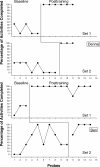Establishing derived textual control in activity schedules with children with autism
- PMID: 20190932
- PMCID: PMC2741070
- DOI: 10.1901/jaba.2009.42-703
Establishing derived textual control in activity schedules with children with autism
Abstract
Activity schedules are often used to facilitate task engagement and transition for children with autism. This study evaluated whether conditional discrimination training would serve to transfer the control from activity-schedule pictures to printed words (i.e., derived textual control). Two preschoolers with autism were taught to select pictures and printed words given their dictated names. Following training, participants could respond to printed words by completing the depicted task, match printed words to pictures, and read printed words without explicit training (i.e., emergent relations).
Keywords: activity schedules; autism; conditional discrimination; derived stimulus relations; stimulus equivalence.
Figures


References
-
- McClannahan L.E, Krantz P.J. Activity schedules for children with autism: Teaching independent behavior. Bethesda, MD: Woodbine House; 1999.
-
- McClannahan L.E, MacDuff G.S, Krantz P.J. Behavior analysis and intervention for adults with autism. Behavior Modification. 2002;26:9–27. - PubMed
MeSH terms
Substances
LinkOut - more resources
Full Text Sources

